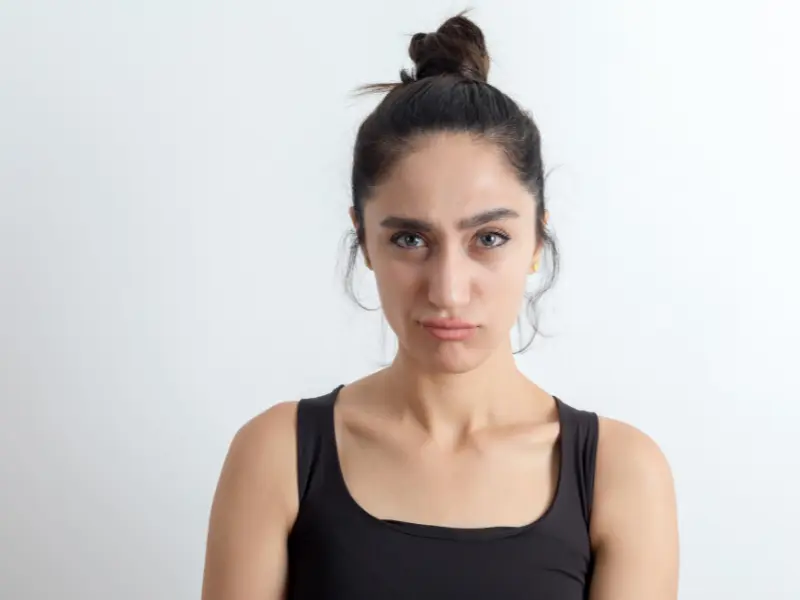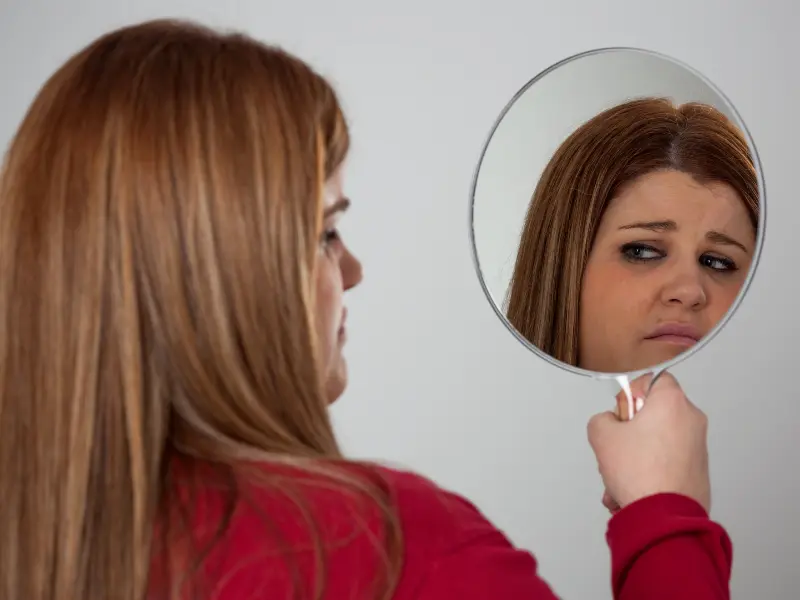Do you ever feel unhappy with your body? Do you compare yourself to others and feel like you fall short?
Negative body image is a common issue that affects many people, regardless of age, gender, or background. It can lead to diminished self-worth, depression, and anxiety.
Body image concerns can arise from various sources, including societal pressures, media images, and personal experiences.
Getting caught up in the idea that we must look for a sure way to be accepted or valued is easy.
However, this kind of thinking can be damaging to our mental and emotional health.
Understanding Negative Body Image

A negative body image refers to a person’s negative perception of their body. It is often characterized by dissatisfaction, shame, and self-consciousness about one’s body.
A negative body image can lead to a range of negative consequences, including low self-esteem, depression, and eating disorders.
Causes of Body Image Issues
Many factors can contribute to body dissatisfaction. These include societal pressures to conform to unrealistic beauty standards, past experiences of bullying or teasing about one’s appearance, and personal experiences of trauma or abuse.
Additionally, individuals who have a history of anxiety or depression may be more likely to experience negative body image.
Body Image Distortion
Body image distortion refers to the inaccurate perception of one’s body. This can manifest in several ways, including overestimating one’s size, underestimating one’s weight, or fixating on perceived flaws.
Body dissatisfaction can be dangerous, possibly leading to unhealthy behaviors such as severe dieting or excessive exercise.
Impacts on Health and Well-being

A poor body image can have a significant impact on both our mental and physical health. It can lead to low self-esteem and a range of mental health consequences, including anxiety, depression, and social isolation.
Mental Health Consequences
Individuals with a negative body image are at a higher risk of developing mental health issues, such as anxiety and depression. These conditions can significantly impact one’s quality of life and may require professional help.
Furthermore, people with body image concerns may avoid social situations or feel self-conscious in public, leading to social isolation and loneliness.
Physical Health Effects
A negative body image can also have physical health effects. It can lead to unhealthy behaviors such as over-exercising or under-eating, which can cause fatigue, weakness, and other physical health problems.
It can also lead to a lack of motivation to exercise or eat healthily, leading to weight gain and other health problems.
Link to Eating Disorders
Understanding the complexity of body image issues means also recognizing the risk of a co-occurring eating disorder, which can manifest as an attempt to control or alter one’s appearance in response to deep-seated dissatisfaction.
If you’re wrestling with a negative body image, seeking support from a mental health professional is crucial. They can assist in addressing underlying issues and cultivating a positive relationship with your body.
Are you concerned that you might have an eating disorder? Please click this link to The National Eating Disorders Association for help.
The Impact of Culture and Society on Body Image Perception

Cultural and social factors play a significant role in shaping our body image perceptions.
Media Influence
Every day, we are bombarded with images of “perfect” bodies. We see pictures of thin, toned, and seemingly flawless people in magazines and social media.
These images can make us feel like our body is not good enough. We may also feel pressure to conform to these unrealistic beauty standards, leading to a negative body image.
Peer Pressure
Peer pressure is another significant factor that can contribute to a negative body image. Our peers’ opinions and perceptions of appearance can heavily influence how we view our bodies.
Negative comments or teasing from friends or classmates about one’s appearance can be damaging and cause long-term body image issues.
Family Dynamics
Our family’s attitudes and behaviors toward appearance can also impact our body image.
If a parent or other family member constantly criticizes their appearance or negatively comments about others’ bodies, it may subconsciously affect our views.
Social Standards
There is immense social pressure to conform to a certain standard of beauty. You might feel that a specific body size or shape is ideal for your culture or social group.
Unfortunately, this standard often excludes people who do not conform to societal norms, leading to feelings of inadequacy and dissatisfaction with one’s body.
Overcoming Negative Body Image

Many people experience periods of dissatisfaction with their bodies. However, there are things you can do to feel better about yourself.
Recognize the Problem
The first step in overcoming negative body image is recognizing your problem. Acknowledge your feelings and accept that they are valid.
Surround Yourself with Positivity
Surround yourself with people who love and support you, regardless of appearance. Positive influences can help build self-esteem and reduce the impact of societal pressures.
Additionally, limit exposure to media that promotes unrealistic beauty standards or triggers negative self-talk.
Developing a Positive Body Image
One way to improve your body image is to focus on developing a positive relationship with your body.
This means learning to appreciate your body for what it is rather than criticizing it for what it’s not.
Focus on Health, Not Appearance
Instead of focusing solely on your appearance, prioritize your overall health and well-being. Engage in activities that make you feel good, such as exercise or hobbies you enjoy.
Practice Self-Care
Self-care involves taking care of your physical, mental, and emotional well-being. This can include getting enough sleep, eating nutritious meals, and engaging in relaxation techniques.
Role of Self-Esteem

Another critical factor in improving body image is building self-esteem.
Self-esteem refers to how you feel about yourself as a person. When you have high self-esteem, you’re more likely to feel good about your own body.
You can work on building self-esteem by setting achievable goals, practicing self-compassion, and surrounding yourself with positive people who support you.
Professional Support and Resources
Dealing with a negative body image can be challenging, and seeking support from a mental health professional can make a significant difference.
Cognitive-behavioral therapy (CBT) is one approach that has shown success in treating body image concerns. It involves identifying and changing negative thoughts and behaviors about one’s appearance.
Mental health professionals can help you work through the underlying issues that may be contributing to your negative body image.
Prevention and Education
Negative body image is a severe issue that affects many people. However, there are ways to prevent negative body image from taking hold and causing harm.
Awareness Programs
One effective method of prevention is through awareness programs.
These programs can be run by schools, community centers, or other organizations and help educate people about the dangers of body dissatisfaction.
They can also provide information on recognizing the signs of a negative body image and seeking help if needed.
These programs can take many forms, such as workshops, seminars, or online resources. They can also be tailored to specific groups, such as teenagers or athletes.
These programs can help prevent poor body image from developing by increasing awareness and understanding.
Community and Support Networks
Another important aspect of prevention is the creation of community and support networks.
These networks can provide a safe and supportive environment for people struggling with a negative body image. They can also offer resources and guidance on how to cope with a negative body image and develop a positive self-image.
Community and support networks can take many forms, such as online forums, support groups, or counseling services.
By providing a sense of community and belonging, these networks can help prevent a negative body image from taking hold. They can also offer support to those struggling with disordered eating patterns.
Prevention and education are vital in addressing a distorted body image and its associated harms.
Increasing awareness and understanding and providing supportive resources can help prevent body dissatisfaction and promote a positive self-image.

